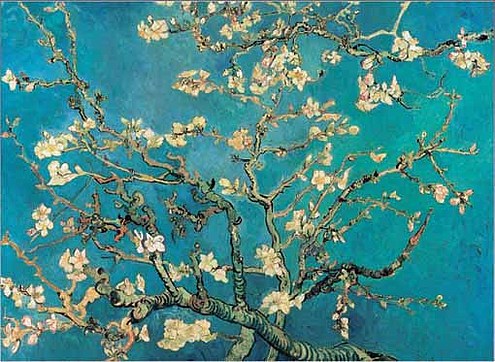The Crows Who Knew the Fox Who Knew My Mother
Always, in the month of May, I feel my mother's presence in the untamed view outside our windows (which was once her view), in the mountain neighbors who once knew her, even in the noisy crows who congregate in the gangly ponderosas in our yard. The elders of this crow family might have been youngsters when Mom was alive, growing as she aged, recognizing her just as they recognized the mother fox and each new set of kits who denned below the house.
Mom loved nature, and walks in the woods, but she also loved Japanese art, exotic travels, world-class museums, good books, classical music, Darjeeling tea, and French food. She never had these things growing up, which is perhaps why, later in life, she loved them so much. She loved Van Gogh, but not as much as she loved Claude Monet. A print of Monet's Japanese Bridge found its way onto every bedroom wall I had as a child.
I've been re-reading my old journal entries from 2004, when my mother's valient struggles with cancer finally got the better of her. She always told us not worry, that she was "just heading out on another adventure."
I lived here with her then, as her caregiver. One of the last meals we shared dining out with neighbors was at Le Central, a small and much beloved French restaurant in Denver. Her weight had not yet dropped to a skeletal 65 lbs., and she was still able to enjoy food. We shared mussels in a white wine broth, French onion soup, escargot, and a spinach salad before going to a booksigning at the Tattered Cover.
A month later, we went to see the "Treasures of Ancient Egypt" exhibit at the Denver Museum of Nature & Science. We had seen many of these same Egyptian treasures in 1964, during a family trip around the world. Fifty years later, with her own death visible on the horizon, Mom found the mummies and burial tombs especially fascinating.
I'm reminded, reading my journals, how lighthearted she was about her own death, She told the hospice nurse one day that she was sure death would come soon. "Tomorrow is the day!" she said emphatically.
When tomorrow turned out not to be the day, she asked me to help her put on her coral-colored kimono (purchased from a shop in Toyko during that same astonishing trip). "It would be lovely to sit on the deck and say goodbye to some of the neighors," she said.
When the crows squawked to announce that the nurse had arrived, Debbie found us on the deck. "I'm glad to see you out enjoying the sun," she said. Mom smiled and answered, "Well, I don’t see any point in lying in bed if I’m not going to die today!”
The neighbors did come--one at a time, staying for short visits after Debbie left. That night, I wrote in my journal, "Mom is so tiny now. On good days, her eyes are bright, her sense of humor fluid, her wit sharp."
While Mom remained lightheared, even to the end, I didn't. Seeking spiritual guidance, I read books like Brian Luke Seaward's Quite Mind, Fearless Heart, Joseph Campbell's The Hero with a Thousand Faces, Thomas Moore's Dark Nights of the Soul, essays by Anais Nin. My healers tried to teach me how to "fill another's well without emptying one's own." Still, my soul emptied as mother's filled.
Eleven months before Mom passed through that mysterious veil of time, she told me she wanted to go to Hawaii to see Brooke, her oldest daughter and my big sister. Brooke had spent years caring for mother in all the ways possible when you live three thousand miles across the ocean.
After traveling together to over 27 countries during that trip around the world, this would be my last adventure with our mother. At the airport en route to Hawaii, Mom befriended an airport employee, Ashama, a young man from Calcutta, India. He helped her into a wheelchair and escorted us through ticketing, security, and, an hour later, finally to our gate - but not before wheeling mom into Pour la France for a cup of tea. "You may perhaps have Darjeeling for my friend Jane?" he asked the hostess, grinning.
A few weeks after Mom died, I wrote this line in my journal, a quote from the Greek author Nikos Kazantzakis.
"I said to the almond tree, 'Friend, speak to me of God,' and the almond tree blossomed."
With a late spring snow falling outside the window today, thinking of the May birthdays my mother and sister have shared, I searched online for photos of almond trees in blossom. And accidentally, of course, I found Vincent Van Gogh's famous painting, Blossoming Almond Tree, which my mother loved because of the strong Japanese influence.
When Van Gogh began this painting for his brother's son, he did not know that within a few months he would no longer be painting, would no longer be alive. "I started right away to make a picture for Theo's son," he wrote, "to hang in their bedroom, big branches of white almond blossoms against a blue sky."
He went on to write, "I felt ill at the time I was doing the almond blossoms. If I had been able to go on working, you can judge from it that I would have done others of trees in blossom..." Alas, he had not been able to go on.
As the snow came down, I searched for more familiar paintings and found Monet's The Luncheon.










Comments